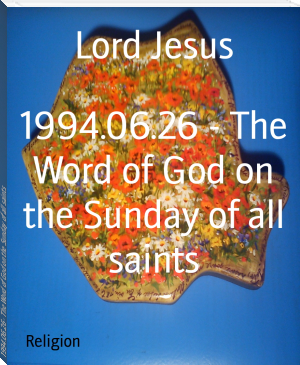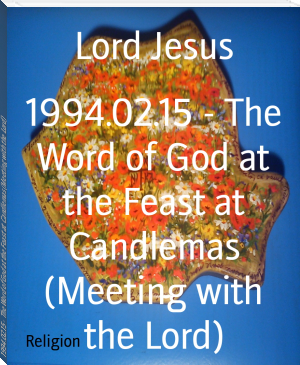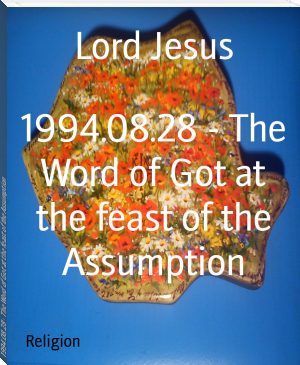Orthodoxy - G. K. Chesterton (books to read to get smarter .TXT) 📗

- Author: G. K. Chesterton
- Performer: -
Book online «Orthodoxy - G. K. Chesterton (books to read to get smarter .TXT) 📗». Author G. K. Chesterton
I do not know if the reader agrees with me in these examples; but I will add the example which has always affected me most.
I could never conceive or tolerate any Utopia which did not leave to me the liberty for which I chiefly care, the liberty to bind myself.
Complete anarchy would not merely make it impossible to have any discipline or fidelity; it would also make it impossible to have any fun. To take an obvious instance, it would not be worth while to bet if a bet were not binding. The dissolution of all contracts would not only ruin morality but spoil sport.
Now betting and such sports are only the stunted and twisted shapes of the original instinct of man for adventure and romance, of which much has been said in these pages. And the perils, rewards, punishments, and fulfilments of an adventure must be real, or the adventure is only a shifting and heartless nightmare. If I bet I must be made to pay, or there is no poetry in betting. If I challenge I must be made to fight, or there is no poetry in challenging.
If I vow to be faithful I must be cursed when I am unfaithful, or there is no fun in vowing. You could not even make a fairy tale from the experiences of a man who, when he was swallowed by a whale, might find himself at the top of the Eiffel Tower, or when he was turned into a frog might begin to behave like a flamingo.
For the purpose even of the wildest romance results must be real; results must be irrevocable. Christian marriage is the great example of a real and irrevocable result; and that is why it is the chief subject and centre of all our romantic writing.
And this is my last instance of the things that I should ask, and ask imperatively, of any social paradise; I should ask to be kept to my bargain, to have my oaths and engagements taken seriously; I should ask Utopia to avenge my honour on myself.
All my modern Utopian friends look at each other rather doubtfully, for their ultimate hope is the dissolution of all special ties.
But again I seem to hear, like a kind of echo, an answer from beyond the world. “You will have real obligations, and therefore real adventures when you get to my Utopia. But the hardest obligation and the steepest adventure is to get there.”
VIII THE ROMANCE OF ORTHODOXYIt is customary to complain of the bustle and strenuousness of our epoch. But in truth the chief mark of our epoch is a profound laziness and fatigue; and the fact is that the real laziness is the cause of the apparent bustle. Take one quite external case; the streets are noisy with taxicabs and motorcars; but this is not due to human activity but to human repose.
There would be less bustle if there were more activity, if people were simply walking about. Our world would be more silent if it were more strenuous. And this which is true of the apparent physical bustle is true also of the apparent bustle of the intellect.
Most of the machinery of modern language is labour-saving machinery; and it saves mental labour very much more than it ought.
Scientific phrases are used like scientific wheels and piston-rods to make swifter and smoother yet the path of the comfortable.
Long words go rattling by us like long railway trains. We know they are carrying thousands who are too tired or too indolent to walk and think for themselves. It is a good exercise to try for once in a way to express any opinion one holds in words of one syllable.
If you say “The social utility of the indeterminate sentence is recognized by all criminologists as a part of our sociological evolution towards a more humane and scientific view of punishment,”
you can go on talking like that for hours with hardly a movement of the gray matter inside your skull. But if you begin “I wish Jones to go to gaol and Brown to say when Jones shall come out,”
you will discover, with a thrill of horror, that you are obliged to think. The long words are not the hard words, it is the short words that are hard. There is much more metaphysical subtlety in the word “damn” than in the word “degeneration.”
But these long comfortable words that save modern people the toil of reasoning have one particular aspect in which they are especially ruinous and confusing. This difficulty occurs when the same long word is used in different connections to mean quite different things.
Thus, to take a well-known instance, the word “idealist” has one meaning as a piece of philosophy and quite another as a piece of moral rhetoric. In the same way the scientific materialists have had just reason to complain of people mixing up “materialist”
as a term of cosmology with “materialist” as a moral taunt.
So, to take a cheaper instance, the man who hates “progressives”
in London always calls himself a “progressive” in South Africa.
A confusion quite as unmeaning as this has arisen in connection with the word “liberal” as applied to religion and as applied to politics and society. It is often suggested that all Liberals ought to be freethinkers, because they ought to love everything that is free. You might just as well say that all idealists ought to be High Churchmen, because they ought to love everything that is high.
You might as well say that Low Churchmen ought to like Low Mass, or that Broad Churchmen ought to like broad jokes. The thing is a mere accident of words. In actual modern Europe a freethinker does not mean a man who thinks for himself. It means a man who, having thought for himself, has come to one particular class of conclusions, the material origin of phenomena, the impossibility of miracles, the improbability of personal immortality and so on.
And none of these ideas are particularly liberal. Nay, indeed almost all these ideas are definitely illiberal, as it is the purpose of this chapter to show.
In the few following pages I propose to point out as rapidly as possible that on every single one of the matters most strongly insisted on by liberalisers of theology their effect upon social practice would be definitely illiberal. Almost every contemporary proposal to bring freedom into the church is simply a proposal to bring tyranny into the world. For freeing the church now does not even mean freeing it in all directions. It means freeing that peculiar set of dogmas loosely called scientific, dogmas of monism, of pantheism, or of Arianism, or of necessity.
And every one of these (and we will take them one by one) can be shown to be the natural ally of oppression. In fact, it is a remarkable circumstance (indeed not so very remarkable when one comes to think of it) that most things are the allies of oppression.
There is only one thing that can never go past a certain point in its alliance with oppression—and that is orthodoxy. I may, it is true, twist orthodoxy so as partly to justify a tyrant.
But I can easily make up a German philosophy to justify him entirely.
Now let us take in order the innovations that are the notes of the new theology or the modernist church. We concluded the last chapter with the discovery of one of them. The very doctrine which is called the most old-fashioned was found to be the only safeguard of the new democracies of the earth. The doctrine seemingly most unpopular was found to be the only strength of the people.
In short, we found that the only logical negation of oligarchy was in the affirmation of original sin. So it is, I maintain, in all the other cases.
I take the most obvious instance first, the case of miracles.
For some extraordinary reason, there is a fixed notion that it is more liberal to disbelieve in miracles than to believe in them. Why, I cannot imagine, nor can anybody tell me.
For some inconceivable cause a “broad” or “liberal” clergyman always means a man who wishes at least to diminish the number of miracles; it never means a man who wishes to increase that number. It always means a man who is free to disbelieve that Christ came out of His grave; it never means a man who is free to believe that his own aunt came out of her grave. It is common to find trouble in a parish because the parish priest cannot admit that St. Peter walked on water; yet how rarely do we find trouble in a parish because the clergyman says that his father walked on the Serpentine? And this is not because (as the swift secularist debater would immediately retort) miracles cannot be believed in our experience. It is not because “miracles do not happen,” as in the dogma which Matthew Arnold recited with simple faith. More supernatural things are ALLEGED to have happened in our time than would have been possible eighty years ago.
Men of science believe in such marvels much more than they did: the most perplexing, and even horrible, prodigies of mind and spirit are always being unveiled in modern psychology. Things that the old science at least would frankly have rejected as miracles are hourly being asserted by the new science. The only thing which is still old-fashioned enough to reject miracles is the New Theology.
But in truth this notion that it is “free” to deny miracles has nothing to do with the evidence for or against them. It is a lifeless verbal prejudice of which the original life and beginning was not in the freedom of thought, but simply in the dogma of materialism.
The man of the nineteenth century did not disbelieve in the Resurrection because his liberal Christianity allowed him to doubt it.
He disbelieved in it because his very strict materialism did not allow him to believe it. Tennyson, a very typical nineteenth century man, uttered one of the instinctive truisms of his contemporaries when he said that there was faith in their honest doubt. There was indeed.
Those words have a profound and even a horrible truth. In their doubt of miracles there was a faith in a fixed and godless fate; a deep and sincere faith in the incurable routine of the cosmos.
The doubts of the agnostic were only the dogmas of the monist.
Of the fact and evidence of the supernatural I will speak afterwards. Here we are only concerned with this clear point; that in so far as the liberal idea of freedom can be said to be on either side in the discussion about miracles, it is obviously on the side of miracles. Reform or (in the only tolerable sense) progress means simply the gradual control of matter by mind.
A miracle simply means the swift control of matter by mind. If you wish to feed the people, you may think that feeding them miraculously in the wilderness is impossible—but you cannot think it illiberal.
If you really want poor children to go to the seaside, you cannot think it illiberal that they should go there on flying dragons; you can only think it unlikely. A holiday, like Liberalism, only means the liberty of man. A miracle only means the liberty of God.
You may conscientiously deny either of them, but you cannot call your denial a triumph of the liberal idea. The Catholic Church believed that man and God both had a sort of spiritual freedom.
Calvinism took away the freedom from man, but left it to God.
Scientific





Comments (0)